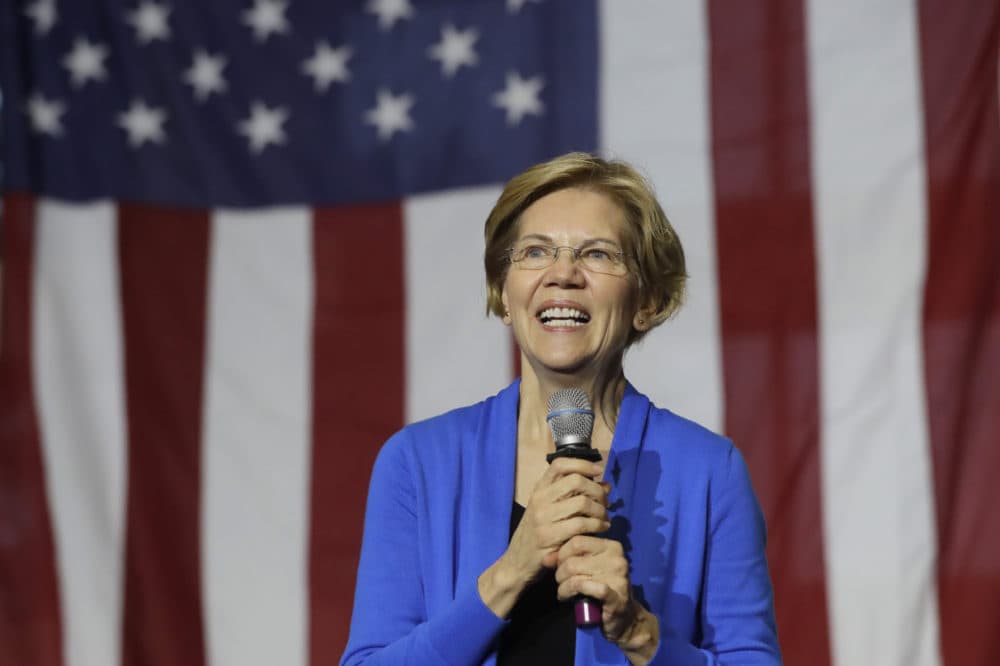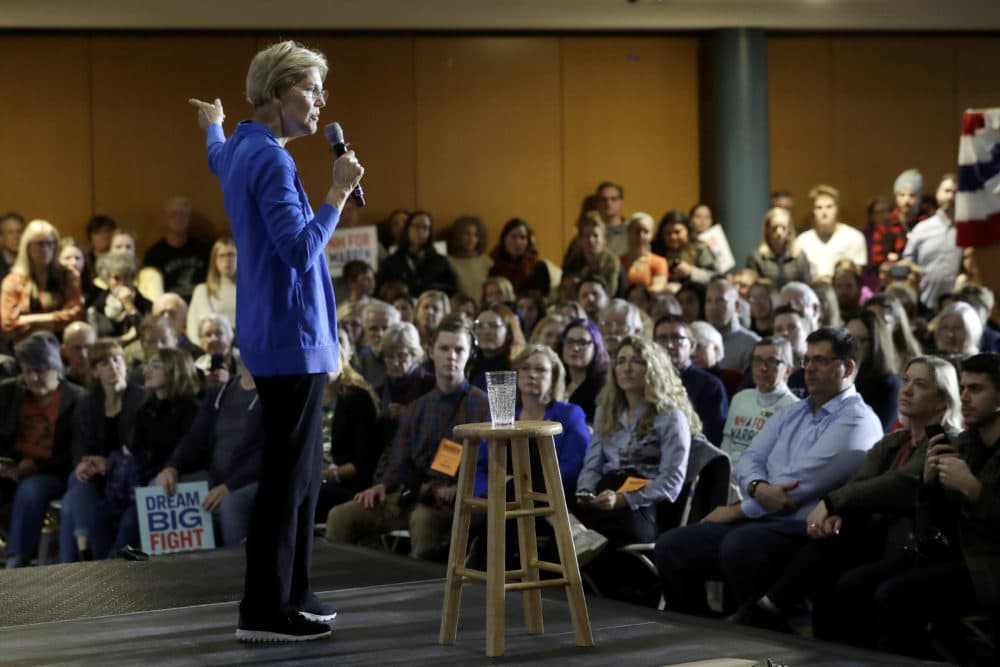Advertisement
Warren Says Her Wealth Tax Would Pay For Needed Programs. Not Everyone Agrees

Time and again on the stump, Elizabeth Warren has said her proposed wealth tax is an overdue correction for inequities in the American economy, and will fund many new programs. Critics, including fellow Democrats, have said her plan won't bring in nearly as much revenue as she claims.
Warren proposed in January that people with more than $50 million in wealth pay an annual tax of 2% on assets beyond their first $50 million. She's also proposed that billionaires pay 6% every year on everything they own beyond their first $1 billion.
Support For Warren's Wealth Tax
At a recent campaign event in Exeter, N.H., the Massachusetts senator and 2020 presidential candidate explained that she has been mulling a wealth tax for years.
"I just see how distorted our economy has become so that people who work hard — who play by the rules — they're just flatlining in terms of income, and yet all their expenses are going up," Warren said. "But for this tiny fraction that amasses big wealth, that wealth just keeps on growing at a huge pace."
To craft her proposal, Warren worked with two economists who also want to see a wealth tax in place. One of them, Gabriel Zucman, teaches at the University of California, Berkeley. In his studies on what happened to the American economy since 1980, Zucman found that, adjusted for inflation, half the country still makes what it did 39 years ago.
"The average pre-tax income for the bottom 50% was $18,000 in 1980, and [today] it's almost the same: $18,500 in 2019," Zucman said. "So you have half the population, you have this huge group that's been excluded from economic growth over more than a generation."
Advertisement
Sage Radachowsky said he's one of the people who feels excluded. He's a carpenter, living and working in the Berkshires. It's a county in Massachusetts that, according to a 2018 study of federal tax data, sees its top 1% of income-earners taking home more than 19 times the average of all others.
On a drive into the center of Great Barrington, Massachusetts, upscale restaurants and boutiques that cater to summering New Yorkers lined the streets.
Radachowsky said that more than a century ago, the Berkshires saw a sort of "Gilded Age."
"A lot of wealthy people built houses up here. It was kind of lifestyles of the rich and elite. And it is again now," Radachowsky explained. "Peppered all around this county are these long driveways with large houses and perfectly manicured landscapes. That's the business around here, mostly. All the services for the wealthy houses: the lawn people, and the carpenters, and the plumbers, and the heating people."
But Radachowsky, who has worked on many of those houses, said he has struggled to save enough money to buy land to build his own house.

In the tony southern Berkshires, he said you need at least $60,000 to buy a plot of buildable land.
"I had saved up $5,000, but that wasn't nearly enough, and that was in several years of trying and working night jobs, too, making basically what I thought was a good wage — carpenter's wage at $30 an hour, too," he said. "It's just the cost of living around here is so high. It's rent, food and maintaining the vehicle. You know, things break down."
Radachowsky, who is 46, said his grandfather was able to buy land in Danbury, Connecticut, working as a carpenter in his 20s.
"He bought land and built his own house,"Radachowsky said. "My grandpa bought land outright. He saved up the money. He saved up $1,500, which was 500 hours at $3 per hour as a carpenter."
Warren's proposal for a wealth tax on people whose wealth exceeds $50 million is supported by 66% of adults in the U.S., according to a New York Times poll conducted in July.
The proposal was especially popular at her events, where the chant of "2 cents" is often heard. The phrase refers to the idea that the tax Warren proposes would amount to relatively little money for those affected.
At the Warren event in New Hampshire, Michele Clock, of Exeter, said she copes with a disability. She came to see Warren speak with her child, who uses a wheelchair.
Clock said it would be "wonderful" if Medicare for All could be funded with Warren's proposed wealth tax.
"She is looking out for all Americans, including those with disabilities," she said.

Matt Porter, 33, of Lowell, Massachusetts, was also in attendance and said he, too, supports the senator's wealth tax. He and his wife have delayed having children, he said, because he owes $74,000 in college loans.
"I think that there's a lot of wealth trapped in the upper echelon, and any way that we can get that to spread down would be great," Porter said.
Economist Zucman, an expert on inequality in the U.S., traced the present-day predicament to massive policy changes that began in the 1980s, when taxes became less progressive under the Reagan administration.
"The U.S. used to have the most progressive tax system in the world and now, essentially, has a giant flat tax where all income groups pay roughly the same tax rate when you look at federal, state and local taxes," Zucman said. "All these changes have happened at the same time and all these changes have pushed in the same direction of increasing income and wealth at the top — partly at the expense of other groups of the population."
Working with Zucman, fellow Berkeley economist Emmanuel Saez has calculated Warren's wealth tax would raise nearly $4 trillion over the next 10 years.
"It is a reliable source of revenue that would be raised from the very rich," Saez explained, "and it is a reliable source of revenue because wealth is now so highly concentrated that there is a lot of wealth, and therefore a large tax base there."
Warren said she would use most of the money raised to pay for Medicare for All, but also to cancel student debt for most students, invest in historically black colleges and universities, and universal day care.
Debate Over Revenue Estimates
Former U.S. Treasury Secretary Lawrence Summers, a Democrat, is among those expressing skepticism of his former Harvard colleague's plans.
"I think the wealth tax is an option that should be seriously explored," Summers said. "But I do believe that there are more straightforward and effective ways of raising revenue — such as increasing tax compliance, such as reforming capital gains taxation, such as reversing the Trump tax cut."
Summers said he see several problems with a wealth tax.
"Advocates of a wealth tax have done the debate a disservice by providing revenue estimates that really can't be defended analytically and are unreasonable," he said.

By Summers' calculations, the wealth tax is likely to bring in half of what Saez and Zucman predict. For one thing, he said they underestimate the ability of the wealthy to hide their wealth.
"The assumption that they make that there would only be 15% avoidance is made up," he said.
"We don't have experience with an American wealth tax, but we do have experience with the American estate tax, and we do have experience with European wealth taxes," Summers added, "and both those experiences suggest that the 15% is a vast underestimate of the level of avoidance."
But Saez said Americans won't be able to escape a wealth tax the way Europeans have, simply by moving to another country.
"In the U.S., taxes are based on citizenship, so moving abroad wouldn't extinguish the wealth tax," Saez said.
Back in Great Barrington, carpenter Radachowsky said thanks to someone who lent him, interest-free, $10,000 for a down payment, he was recently able to get a construction loan to buy his plot of land.
But he still supports a wealth tax. He's backing Bernie Sanders, who has also proposed a wealth tax.
"People are strapped, stretched out far too much," he said. "A wealth tax would help that. Somebody has to bail out the people. We have to bail out the people. And this is what this wealth tax is coming down to."
This segment aired on December 5, 2019.
